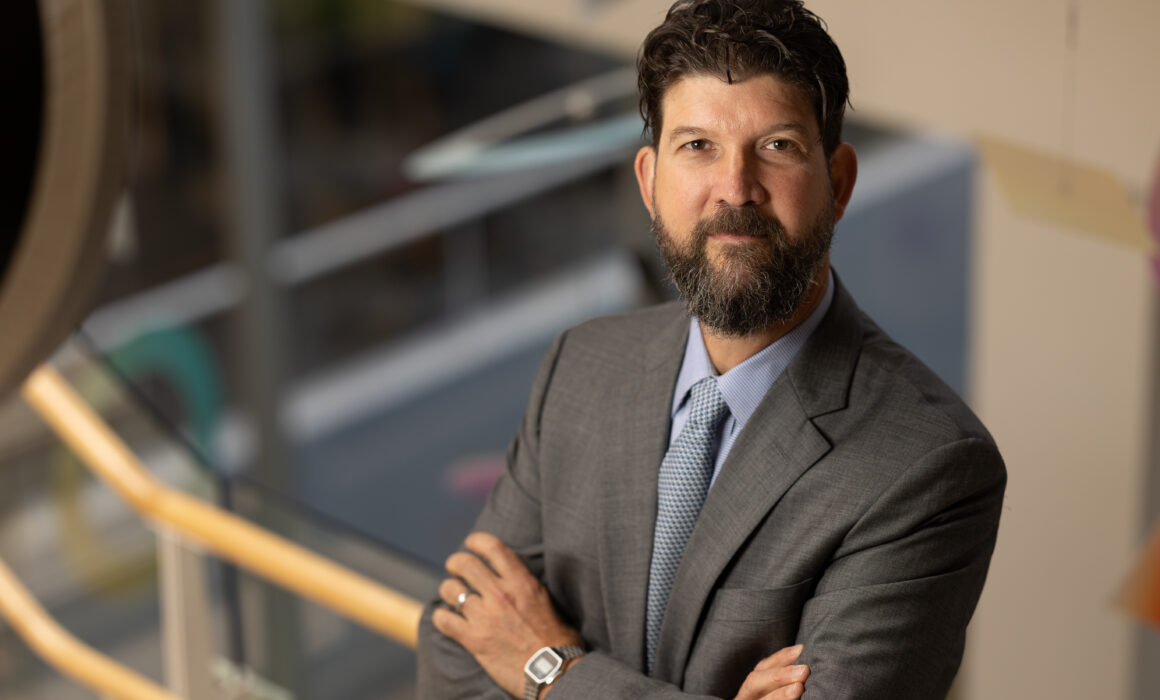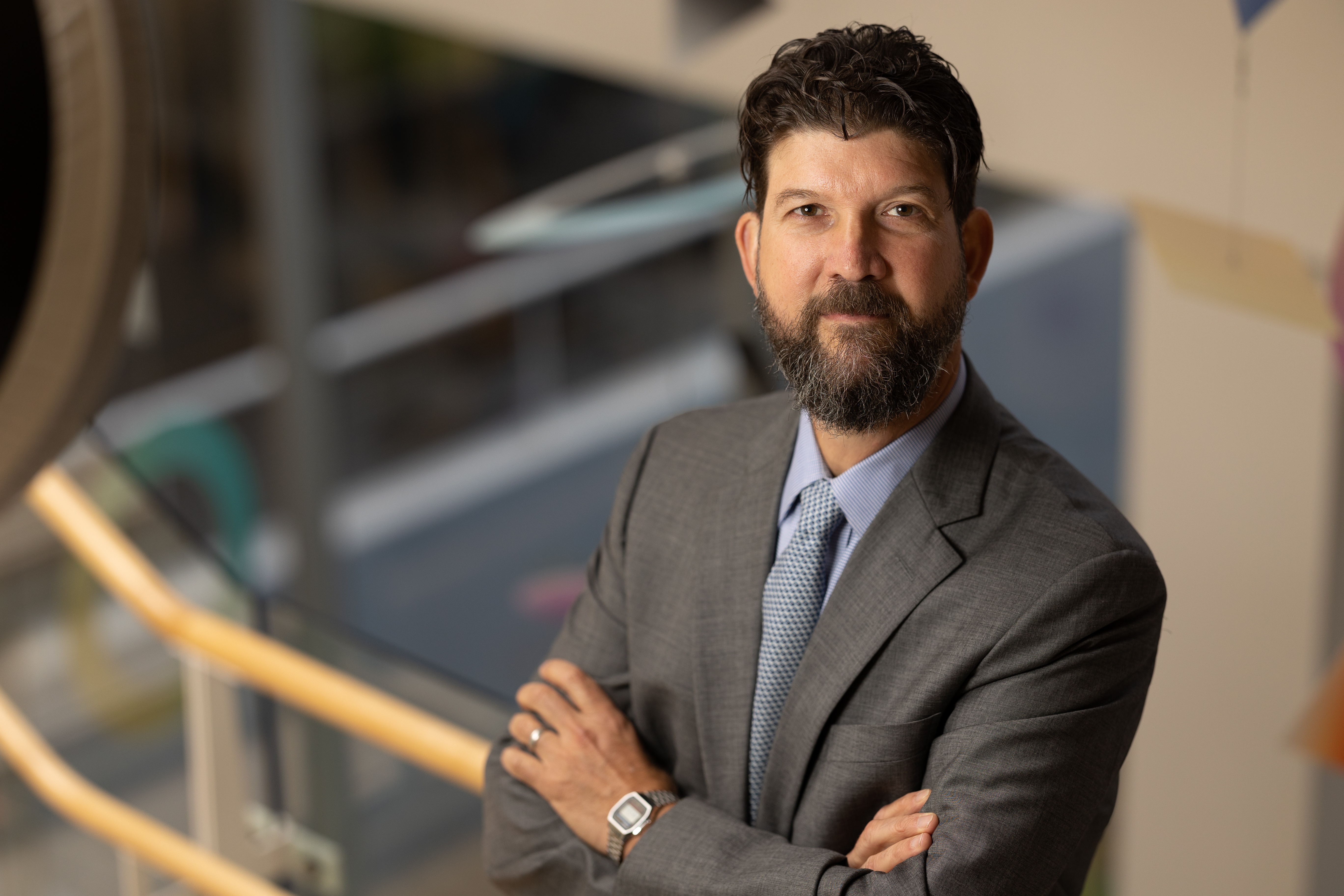
WHEN DAVID GOLDBERG becomes president of CTA on June 26, it will be a natural progression of what he has been doing since he was a kid: speaking up for the disenfranchised, trying to right wrongs, being of service to others and acting and leading collectively to make change.
It’s in his blood — and his roots in Echo Park in Los Angeles, where he grew up and lives today. His mother and grandmother, both educators, were LA union strike captains. His father has been a community lawyer in Echo Park for 50 years. In elementary school, Goldberg organized other children and marched as “Kids Against Nukes.” In high school he was arrested when he and fellow high school activists took over the South African consulate to protest apartheid.
“I’ve been an activist my whole life,” Goldberg says. “For my parents, that was their whole lives, that’s why they moved to Echo Park, an area known for its history of activism back in the ‘40s and ‘50s.”
Lessons from his family’s advocacy work were deeply ingrained. From his mother’s participation in the United Teachers Los Angeles (UTLA) strike in 1989, for example, “I learned what it means to be accountable to each other and what it means to lay it all on the line for your coworkers, your profession and your students — and what it means to be part of a broader struggle to create the world we deserve.”
He became a teacher through an LA Unified School District intern program when the district was seeking bilingual educators. This was during the mid- and late 1990s, when immigrant students and bilingual education in California were under attack. Goldberg’s activism, of course, kicked in, first at UTLA and then at CTA, as he worked on myriad education and social issues and rose steadily through the leadership ranks.
Leading CTA offers a bigger stage and— especially during these times — a bigger challenge than Goldberg has experienced before, but he’s ready for it.
“Leadership is service, it’s not a position. So, while it is my life’s professional honor to be your president, it’s really about service,” he says. “I am honored to be a part of an organization that has such capacity and potential to impact the lives of our members in a way that we deserve — and to be part of a struggle for what our students deserve.”
In a short interview in May, Goldberg spoke about CTA and his vision for the union going forward:
On the importance of connecting with members:
I’m committed to democratic, bottom-up leadership. Our CTA local presidents are the backbone of our organization, and we have to figure out better ways to be connected and responsive to them. For presidents to be more responsive to members at their work sites, we must be more
responsive to them.
One way we’re doing that is through CTA organizing grants around site visits, etc. — [this helps ensure we have] a place where members and leaders can debrief, discuss lessons learned and what support they need from CTA. I’d like to have deeper democratic conversations about the direction of our union, at State Council and in the regions. CTA is such a big, incredible, finely tuned organization but sometimes it’s easy for all of us to skip steps that take a bottom-up look at what we’re doing to meet the needs of our members.
On CTA and community schools:
Goldberg is spearheading CTA’s work with community schools, a partnership with the state, school districts, students, families and communities (see cta.org/communityschools).
The model of community schools is a bottom-up, anti-racist model, a democratic model. It’s a model that builds power with community, that brings broader issues of the common good to the table. And it’s a model that breaks down a lot of silos within CTA and in our locals so we all work together in ways that allow us to recalibrate our relationship with each other.
For me it has been an important way to see the value that CTA can bring to locals. I’m trying to figure out how to use the community schools model, where people connect to and support each other, throughout all of CTA.
 David B.Goldberg
David B.Goldberg
BORN, RAISED AND LIVES: In Echo Park, in northeast Los Angeles
FAMILY: Wife Karla Alvarado-Goldberg (psychiatric social worker with LAUSD and UTLA member); children ages 16, 19 and 22
CAREER AS AN EDUCATOR: Most of his 25+ years in the profession have been as a bilingual teacher at Murchison Elementary in LAUSD
UNION ACTIVITY: Multiple leadership positions, including UTLA Treasurer, CTA Director, CTA Secretary-Treasurer, CTA Vice President
EDUCATION: B.A., Community Studies, UC Santa Cruz
RANDOM FACTS: Practices Transcendental Meditation twice a day; trilingual including Spanish and sign language; briefly played pro basketball overseas; relaxes through beach bike rides with Karla
On CTA’s strengths:
At CTA, our real power is broader than just one local. We have a gift — a union where we come together, have conversations, have political disagreements, and come up with a plan and action to build power and win what our members and students deserve. We represent different communities. We come from all walks of life, we come from different racial backgrounds, gender backgrounds, who you choose to love. We have a place where we can bring all that in as an asset, as a real strength.
Educators overwhelmingly are still respected and even revered in many communities. So we are uniquely situated to stand up not only for ourselves, but we have the capacity to lead broader struggles. Because we are in every community across the state [we can work to] change our schools, and through schools, change our society. Connected as we are to a broader vision of a common good,* we can organize and lead around issues The fight for issues of the common good, such as equity and social justice, is huge.
For us to really win what we deserve will take a movement. Our biggest asset is our members.
On his objectives as CTA president:
There are a few overarching goals: I want to continue to engage with and make common good issues the core of CTA work, where we bargain not just around salary and healthcare but around issues that impact our students and communities.
We’ve got to deal with funding for public education — we can’t continue to meet any of our goals for members and students with devastating cuts and generations of disinvestment. And we must work on respect for our profession, especially with salaries and teaching and
learning conditions.
But the bigger goal that helps us get there is CTA building a deeper connection with our members at every local, every level, every school site. As CTA has grown over the decades, some of these connections, our bottom-up vitality, got lost. We need to make our union resonate and have relevance around the everyday issues that our members confront at school sites. This includes curricular issues, disrespect from supervisors or principals, the ability to connect and work in coalition with families and students to get what they deserve. The democratic disagreements and working through issues that we have at CTA State Council should mirror what’s going on at our work sites. The business we take up at State Council should be driven by that work. We all must think this out together.
On the challenges:
Our most basic needs are not being met. Funding for schools impacts our members’ ability to have the middle- class lives that they, and all workers, deserve. It’s particularly intense in California because after Prop. 13 so much of our state income doesn’t come from property taxes, which are more stable, but from income tax, which is sporadic. So when the economy goes bad we make devastating cuts that set back our workers, families and communities.
We need to make corporations pay their fair share, which they do not. We also need to extend or make permanent initiatives such as Prop. 30 and Prop. 55 —the latter of which expires in 2030.** Regarding the teacher shortage, I look forward to recommendations from CTA’s New
Educator Pipeline and Support Workgroup for concrete steps we can take to both bring folks into this profession and create an environment where members who have dedicated their lives to [teaching] want to stay.
Beyond that, we must be part of the movement to fight back against attacks on us as workers and unionists, and targeted attacks on, for example, trans students, librarians and our members.
I’m sure I’m going to be humbled on day one as president. The struggle is so big, the scale is so big. But I’ve spent years building connections to members and member leaders as a local leader, board director, officer, etc. I’ve done enough to both be humbled and to have some ideas on how we can work together in new and exciting ways.
I look forward to continuing to engage with you — our members — to lead with you, not in a position of power over you but in power with you. Onward and upward, let’s keep building the union that we deserve and our students deserve.
The Discussion 0 comments Post a Comment